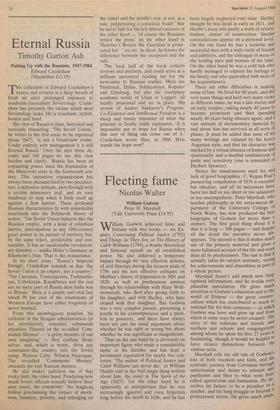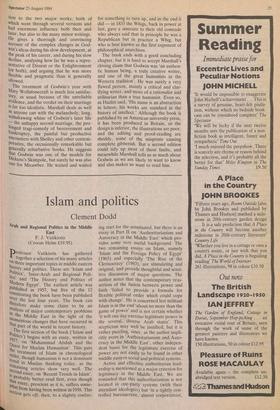Fleeting fame
Nicolas Walter
William Godwin Peter H. Marshall (Yale University Press £14.95)
William Godwin achieved fame and fortune with two books — An En- quiry Concerning Political Justice (1793) and Things As They Are, or The History of Caleb Williams (1794), a double theoretical and fictional assault on all established power. He also achieved a temporary impact through his very effective defence of civil liberties during the treason trials of 1794 and his less effective critiques on Malthus's theory of population in 1801 and 1820, as well as posthumous interest through his relationships with Mary Woll- stonecraft, who died after giving birth to his daughter, and with Shelley, who later eloped with that daughter. But Godwin was a very complex person, presenting a puzzle to his contemporaries and a prob- lem to posterity, and there have always been not just the usual arguments about whether he was right or wrong but about whether he was significant or insignificant.
Thus on the one hand he is obviously an important figure who made a considerable name in his lifetime and has kept a permanent reputation for nearly two cen- turies. 'The author of Political Justice and Caleb Williams can never die,' as William Hazlitt said in the best single thing written about him, the essay in The Spirit of the Age (1825). On the other hand he is apparently so unimportant that he was increasingly ignored and even forgotten long before his death in 1836, and he has
been largely neglected ever since. Shelley thought he was dead as early as 1811, and Hazlitt's essay was partly a work of rehabi- litation, almost of resurrection. Similar contradictions appear on a personal level. On the one hand he was a sociable and successful man with a wide circle of friends and admirers, and the colleague of many of the leading men and women of his time. On the other hand he was a cold fish who hardly managed to express his feelings to his family and who quarrelled with most of his acquaintances.
There are other difficulties in making sense of him. He lived for 80 years, and did very many things and held very many views at different times; he was a late starter and an early stopper, taking nearly 40 years to become prominent and then spending nearly 40 years being obscure again; and a vast amount of documentary material by and about him has survived in all sorts of places. It must be added that most of his many writings are vitiated by his heavy Augustan style, and that his character was marked by a virtual absence of humour and spontaneity and a morbid combination of pride and sensitivity (one is reminded of Herbert Spencer).
Hence the simultaneous need for and lack of good biographies. C. Kegan Paul's pioneering compilation of 1876 is essential but obsolete, and all its successors have been too dull or too short or too adulatory or too unsympathetic. Peter Marshall, who teaches philosophy in the extra-mural de- partment of the University College of North Wales, has now produced the best biography of Godwin for more than a century. The first good thing about it is that it is long — 500 pages — and despite all the detail the narrative never dis- appears. The second is that it makes much use of the primary material and gives a more balanced account of the life and work than all its predecessors. The last is that it actually takes its subject seriously, seeing his achievements and absurdities as part of a whole person. Marshall doesn't add much new biog- raphical information, and he avoids even; plausible speculation. He gives much attention to Godwin's education and to the world of Dissent — the great counter- culture which has contributed so much to national life for four centuries — in which Godwin was born and grew up and from which in some ways he never escaped. The story of the relations and friends and teachers and schools and congregations among whom he spent his first 27 years is fascinating, though it would be helpful to have clearer distinctions between the various sects. Marshall tells the old tale of Godwin's loss of both vocation and faith, and his symbolic journey from Calvinism through, unitarianism and deism to atheism and pantheism and then to what were later called agnosticism and humanism. He de- scribes his failure to be a preacher or a teacher, and his long struggle to become a professional writer. He gives much atten-
tion to the two major works, both of which went through several versions and had enormous influence both then and later, but also to the many minor writings. He gives a thorough and convincing account of the complex changes in God- win's ideas during his slow development, at the peak of his career, and during his slow decline, analysing how far he was a repre- sentative of Dissent or the Enlightenment (or both), and arguing that he was more flexible and pragmatic than is generally allowed.
The treatment of Godwin's year with Mary Wollstonecraft is much less satisfac- tory, as usual because of the unreliable evidence, and the verdict on their marriage is far too idealistic. Marshall deals as well as anyone can with the melancholy,' long, withdrawing whine of Godwin's later life --- the unhappy second marriage, the pro- longed tragi-comedy of bereavement and bankruptcy, the painful but productive encounters with Shelley and other contem- poraries, the occasionally remarkable but generally rebarbative books. He suggests that Godwin was one of the models for Dickens's Skimpole, but surely he was also one for Micawber. He waited and waited for something to turn up, and in the end it did — in 1833 the Whigs, back in power at last, gave a sinecure to their old comrade who always said that in principle he was a Republican but in practice a Whig, but who is best known as the first exponent of philosophical anarchism.
The book ends with a good concluding chapter, but it is hard to accept Marshall's closing claim that Godwin was 'an authen- tic human being, a truly creative writer, and one of the great humanists in the Western tradition'. He was surely a very flawed person, mainly a critical and clar- ifying writer, and more of a rationalist and utilitarian than a true humanist. Even so, as Hazlitt said, 'His name is an abstraction in letters; his works are standard in the history of intellect.' Although the book is published by an American university press, it has been produced in Britain, so the design is inferior, the illustrations are poor, and the editing and proof-reading are shoddy, some of the misprints causing complete gibberish. But a second edition could tidy up most of these faults, and meanwhile Marshall tells us as much about Godwin as we are likely to want to know and also makes us want to read him.







































 Previous page
Previous page